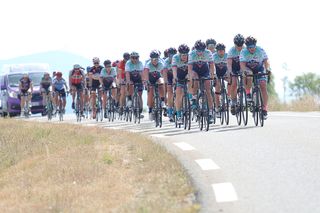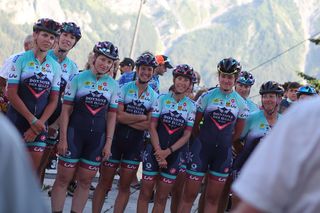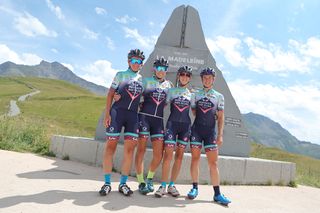One day ahead: Donnons des Elles au Velo J-1 and the Tour de France
French club continues gender equality initiative by riding every stage a day ahead of the men's peloton until Paris










The Donnons des Elles au Velo, a game-changing French cycling club, has an initiative J-1 or Journée -1 to signify riding one day ahead of the men’s peloton during the three-week Tour de France. It was founded in 2015 with the aim of highlighting gender inequality in cycling — and specifically the lack of a Tour de France for women. Since then, a group of riders from the club have set out each year to ride every kilometre of the men’s race one day ahead of the peloton.
The J-1 riders will be, once again, traversing the 21 stages of the Tour de France that starts in Brest on June 26 on the same day as the Women's WorldTour La Course. However, with a Tour de France Femmes on the horizon for July 24-31 in 2022, the focus has shifted.
“First of all, we are really, really happy because of course, it's one of the objectives or one of the main objectives of this action,” says Nathalie Giloy — who will be taking part in the J-1 ride starting this week. “So we're really happy to see it fulfilled. We are believing we have like a little part of it. At least we hope so.”
Giloy rode alongside the J-1 group for a few of the stages in 2019 before taking part in the full 21 days last year. Instead of riding one day ahead of the men’s race, the 2020 edition took place one month before due to logistical difficulties.
“At first we were like, ‘okay, just doing it one month before, we might not get the same attention,” recalls Giloy. However, they found that the host towns and cities were equally, if not more, welcoming, “they actually had really more time to dedicate to us, because we were one month ahead and not just one day.”
Although nobody was camped out waiting for the pro men to race through the next day, the J-1 riders were still well supported: “on one mountain there were people saying 'go girls, go girls' and we did not expect that actually. So it was really nice,” recalls Giloy. “When people came, they came for us [and] they weren't already there for the men. So that was quite cool.”
Giloy hopes that the support that she and her fellow riders received foreshadows the standalone support that the women’s pro peloton might see in 2022 and she is hopeful that the organisers’ decision to run the race after the men’s event will ensure that they are not overshadowed.
Get The Leadout Newsletter
The latest race content, interviews, features, reviews and expert buying guides, direct to your inbox!
“It's like a relay where the men are giving the relay to the women as they arrive on the Champs-Élysées and then the girls will start from the Champs-Élysées, so I kind of like the symbol,” she says.
“I think it's also good that it's not on the same day as and on the same period as the men's,” she added. “Because, of course, most of the people will watch the men's race. And I don't know if the majority of the people would stay in front of their TVs for the girls’ race for people that they do not really know yet. So I think it's interesting, too. It's okay that and it's good that they have their own race on their own dates.”
The race might be taking place one year later than planned — due to COVID-19 and the Olympic Games — but Giloy and her Donnons des Elles au Velo colleagues believe that it might yield a better race. “We think it's good for the organisers to have one more year to organise it in order to make sure that it's going to be a really, really interesting race, and not just something they organise, which has no success.”
Building the base

The goal of a women’s Tour de France has been achieved, but the group still intends to continue to ride for a cause, placing an importance of building grassroots women's cycling and gender equality.
“Still cycling is somehow a men's sport and we want to change this image and this is why we want to continue,” says Giloy. “We want to continue to promote women's cycling, but also gender equality in cycling.
“And this year, we [have] more focus on also raising awareness on [the fact that] if you want to have a really nice high-performance cycling and professional cycling, then you also need to have a base level, basically, that you can have like this pyramid.”
It’s the ‘base level’ that Giloy and her fellow riders are hoping to encourage more women and girls to start at, in the hope that they will go on to compete.
“In France, we only have 10 per cent of female licences at our French Cycling Union. So basically, this is something we want to change,” she says.
Giloy is hopeful that she and her fellow riders will be seen as role models for a younger generation, too. “In France, when I talk about female cycling, then most of the time, everybody still talks about Jeannie Longo. But of course, today, she's 60 and she had her career like 30 years ago,” says Giloy.
“So basically, we want to show that it is possible for girls to cycle and to compete in cycling. And so we want to give cycling kind of a new image. And also encourage girls to go into cycling clubs.”
Giloy describes the kind of statement she hopes the J-1 riders can make: “When you enter a city or whatever, then they see the first two riders and they will say 'oh, it's a men's peloton,’ which they're quite used to seeing,” she says. “But when they see like six or seven girls, then they're like 'wow'. That's kind of what we want to provoke. We want to show a girl’s peloton which is less common than a men's peloton.”
Tour de France Femmes: 8 days is an exciting start

Although she has been part of a team setting out to prove that women can ride over the same distance as the men’s race, Giloy believes that the eight-day 2022 Tour de France Femmes, from July 24-31, is long enough for the moment.
“I think it's okay to have a eight days race. Better short and intense than long and boring,” she says. “The reality, actually, today, the level in women's cycling is not as high and you don't have the density to have as the men...so I think, first of all, it's nice to have a short race but to have an intense race and so quite an exciting race.“
Of course, the crucial difference between the women’s peloton and the Donnons des Elles au Velo J-1 riders is that the latter are not racing, but they will be riding all 21 stages of the Tour de France.
“It's not a race. So we take our time and we respect the traffic lights and stop signs and stuff,” says Giloy. “When it's hilly or flat then we stick together, but of course in the mountains, then every girl rides up the mountain at her own pace, and then we wait together. We wait for everybody.”
What about the long, flat sprint stages? “Yeah, I'm quite scared of the longest stage,” Giloy admits. “I think it's seven or eight. It's 250 kilometres, and I hope there will just not be so many long straight roads.”
To break up the day, the riders have multiple stops along the way and there is no time limit for finishing the stage. “So basically, you don't look at this stage as like a 200km stage. It's like ‘okay, well, the first break is at kilometre 50. The lunch break is at km110.’ It's just bit by bit,” she says.
“I think that's what makes it easier at the end of the day is to say, 'wow, we just did like 200km with x metres of climbing' so it's just like, you have to have some small steps and to cut each stage in. Because actually it takes us all day long to do a stage. It's not like the men's.”
Changing the perception

Much like their pro cycling counterparts, the J-1 riders are accompanied by multiple staff members to ensure they are able to complete the course safely and without injury.
Giloy details the ten staff that are on hand for the twelve women including physiotherapists, an osteopath, mechanics, a photographer, outriders and other general support staff along the way.
“We are really happy to have staff like this, which makes all of it, not easy, but a lot easier for us,” says Giloy. “We just have to ride the bikes. This is basically just all we need to do and smile for the photos. And they take care really of the rest.”
With the continued support of their staff, fellow riders, and fans of the initiative both on the roadside and online, the Donnons des Elles Au Velo J-1 riders are not planning to slow down.
“We want to continue to promote cycling but also work more on a local and regional scale. With local clubs, or with local authorities,” says Giloy. “For instance, I have been organising some female rides here in Brest in collaboration with the Giant store, and it was really nice because everybody was so happy to see [it] and they all told me it's so cool to just be riding with girls. We've never done it and unfortunately it's not the same than with men.”
Changing the perception of cycling as a men’s sport and encouraging more women to ride is at the core of their campaign.
“Cycling is mostly or is often considered as a men's sport, which has actually no reason to be,” says Giloy. “It's a sport like every other sport, and there should be no - female cycling or male cycling - it should just be cycling.”
We ride for equality. We ride for a women’s Tour de France. Official or unofficial, we return next year. Are you in? #ThisIsOurTime pic.twitter.com/42L64U1Y4uAugust 3, 2018